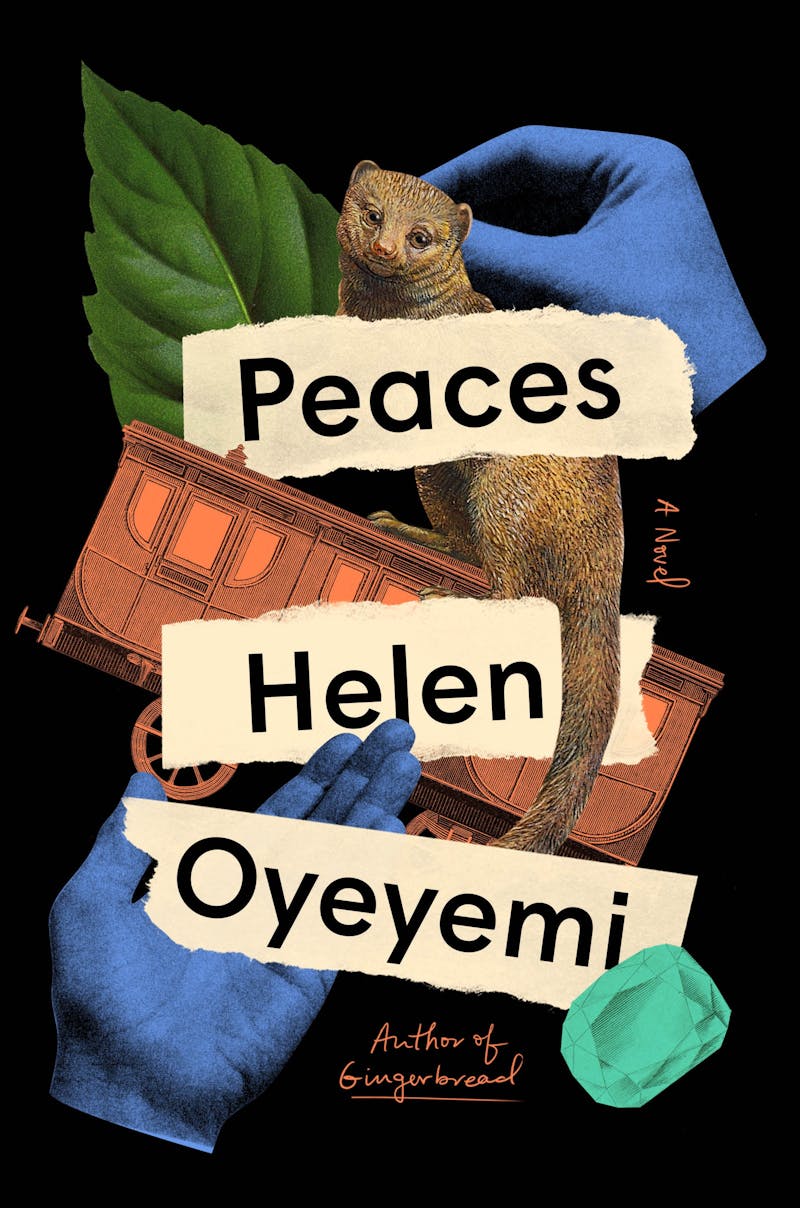Halfway through Helen Oyeyemi’s new novel, Peaces, I put the book down and looked up instructions on how to play the board game baduk. I found a video clip on YouTube that explained the rules. “It’s all about marking your territory,” a voice said before a video simulation came on-screen. The blank board started filling up with black and white dots, the game pieces, as imaginary players placed them side by side (up and down, left to right) until they formed little squares. Everything inside your square is yours, area you have staked out, claimed and defended from the spatial intrusions of your opponent. Whoever occupies the most space on the board by the end of the game wins. In Peaces, a woman posing as a train attendant bursts into a compartment and holds everyone inside at gunpoint, demanding one of passengers, a former North American champion, grant her a rematch—though he does not know why, since the last time they played, he says, she “wrecked my strategy like a quickly scattering pair of evil bitch demon pincers.”

In an interview with Bookforum, Oyeyemi said she is drawn to “books that are like games.” Anytime she can write one, she says, “I feel like I’m developing toward something, some style.” Watching the explainer video on baduk, I was reminded of how passengers on Amtrak trains put a bag down on the seat next to theirs—real-life game pieces, as it were—to try to mark out the entire row for themselves. The delicate dance that trains impose—between public and private, between what space is mine and what is yours, is the game Oyeyemi seems to be playing at in Peaces. The novel is set entirely on a train, makes frequent use of flashbacks to the characters’ prior train journeys, and meditates throughout on the unique sociality of the classic locomotive with its themed cars and enclosed compartments. Trains provide a “sticky mix of enclosure and exposure,” one of her characters, a technically not married newlywed named Xavier reflects, a foreboding space precisely because people, “just get … involved with each other. Can’t avoid it.”
The novel—which features a constellation of relationships (honeymooners, still-in-the-picture exes, overbearing aunts, seatmates) is about how involved we want to be with one another as people. How much space are we willing to concede to make room for another person in our life, in our country? As the train rocks back and forth, Oyeyemi’s characters are likewise off balance, trying to find an elusive happy medium between desiring company and wanting to be left alone, between needing privacy and equally needing to be truly and fully seen.
At the center of the novel are Otto and Xavier, a couple who have decided to spend their honeymoon on board a train called The Lucky Day. Their relationship is a life raft. Both men, we learn, are bruised from past heartaches, disappointments, and relationships that left them feeling unsettled, unsure of their very grasp of reality. “You run the romantic gauntlet for decades without knowing who exactly it is you’re giving and taking such a battering in order to reach,” Otto sighs. “And then,” he says of meeting Xavier, “by some stroke of fortune, the gauntlet concludes, the person does exist after all.”
Their train voyage is billed as the Lakes and Mountains Route; it starts off from England but swiftly ventures into an obscure and disorienting geographic mélange. Oyeyemi punctuates these moments with her signature humor, a kind of millennial mundane that grounds her otherwise fantastical works. Feeling adrift, Xavier says to Otto: “At the risk of sounding like a thirty-something-looking teenager on Dawson’s Creek, I just really need to know where we are.” There is no one they can ask, as the train, it turns out, is privately owned by a mysterious woman named Ava Kapoor, seemingly the only other passenger on board and whom the honeymooners have been given strict instructions not to disturb. Shortly after boarding, Xavier does manage to catch a brief glimpse of her. She is holding a sign, though—alarmingly—they cannot tell if it reads “hello” or “help.”
There turn out to be two other people on board: Ava’s girlfriend, Allegra, who drives the train, and a brusque woman named Laura who seems intent—for reasons at first unclear, on keeping people away from Ms. Kapoor. There is potentially a third person on the train, an invisible interlocutor who either might be out to harm Ms. Kapoor or could be an incarnation of one of Otto’s exes (a fun conceit of the novel is that the people who ghosted us might simply have just turned into ghosts).
Allegra and Laura work to keep Ava at an equilibrium, free of stressors or any interaction that might disturb her well-being and mental health. Ava, we eventually learn, is to inherit money from her late employer, but only if she passes a psychological examination at the end of a four-year period. To ensure success, Allegra came up with the idea that they would live on a train. Perpetually in motion, unmoored from the world and its stressors, they could find peace. The occasional stranger—like Otto and Xavier, would be let on board to give Ava a modicum of social interaction but not so much that it would cause distress: “Talking to strangers,” she tells them, “can be riskier than it is rewarding; even people who know each other well talk at cross purposes and derange each other’s perceptions.” The last point strikes a chord with the couple precisely because they are a couple. To make room for privacy within an intimate relationship requires, the novel at points suggests, a degree of secrecy and obfuscation that cannot be felt as anything other than betrayal.
Despite much of the phantasmagorical nature of the novel (greenhouse train compartments, a mongoose whose lithe limbs recall Nijinsky, flashbacks to pistol-wielding baduk players), there is much that will feel all too real to readers dealing with trust and intimacy in a hyperconnected age, like suspicious texts from unsaved numbers or the opacity of the word friend. Then there are old-school classics—the giveaway clues uttered during sleep. Xavier at times feels just as disconnected from Otto as Ava is from steady ground. He tells Allegra that “the bubble she’d been building wasn’t that much stranger than life in the real world.” Talking about Otto without saying his name, Xavier tells her about “a guy who only claims to know how to say ‘hello,’ ‘goodbye,’ ‘thank you,’ and the day of the week in Czech” (Otto’s last lover before meeting him was from Czechia). Yet in his sleep, Xavier says, this person speaks the language fluently and often repeats the words “Pojd’ blíž … Pojd’ blíž.” What does it mean, Laura asks. Xavier looked it up; it means “come closer.” Yet when Xavier moves toward Otto in bed, he pushes him off. “It wasn’t me he was talking to,” Xavier says wistfully.
Like all of Oyeyemi’s novels, Peaces goes to places in fiction that feel almost impossible. I reread the ending several times, and I am still not sure I entirely understand what happened—in my defense, neither do the characters. I felt similarly about parts of her last novel, Gingerbread, a recasting of the story of “Hansel and Gretel,” whose themes of migration, displacement, and resources led many to read it as a commentary on Brexit—the dream of multicultural Great Britain feeling at the time like a similarly dark, contorted fairy tale. One could, if inclined, certainly tease out similar themes from Peaces. The novel at its core is about our willingness and unwillingness to share space—on a train, but also on earth. Otto and Xavier’s relationship can thus be about themselves or a metaphor for something bigger—more political—but I think Oyeyemi is happy to keep it at the interpersonal level and leave extrapolations to the extrapolators. Once asked in an interview about how her works touch on questions of migration, she responded: “No, no!” Indeed, though they are surrounded by the distracting, shiny objects of Oyeyemi’s world-building, Otto and Xavier never leave our focus.
The title of the novel nudges us to see them as two pieces, separate from one another, but part of a set. For couples, that can be both a source of peace and also the very thing that gets in the way of it. Fortunately, Oyeyemi is interested in magic. In her novels, anything is possible—including seeing into the soul of another person who will simultaneously always be a mystery to you. Trains, after all, are good settings for that sort of thing.








